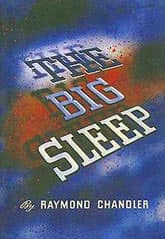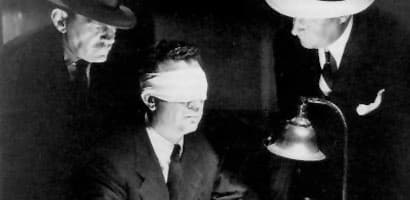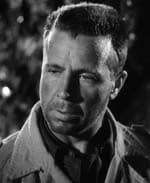The Big Sleep
Critique • Quotes • Philip Marlowe at the movies
 First edition
First editionFirst publication
1939
Literary form
Novel
Genres
Crime, mystery
Writing language
English
Author's country
United States
Length
Approx. 72,000 words

Philip Marlowe (Dick Powell) is interrogated in Farewell, My Lovely—er, Murder, My Sweet—in 1944.
The real Marlowe
Murder, My Sweet (1944): Also known as Farewell, My Lovely; film, 95 minutes; director Edward Dmytryk; writer John Paxton; featuring Dick Powell, Claire Trevor, Anne Shirley
Only two years after the Falcon fiasco (a fiasco for Marlowe fans, that is), what most consider the definitive Farewell, My Lovely came out—titled Murder, My Sweet in the United States.
Former song-and-dance man Dick Powell became the first to play Philip Marlowe under that name, and some say he was the best Marlowe—perhaps the best-ever movie PI. Not physically imposing but quietly effective, with just the right balance of do-gooding and world-weariness. Yet always wisecracking—with many lines lifted directly from Chandler, along with some dillies created for the film.
Also memorable is movie tough-guy Mike Mazurki as Moose Malloy, whose role is upgraded somewhat, as well as uplifted. In this adaptation he actually hires Marlowe to find his Velma and doesn't kill anyone till well into the story, although the big guy disappears for the middle part of the movie.
The film starts with a blinded Marlowe undergoing police interrogation (under an intense light, which come to think of it doesn't make sense). Much of the movie to come is the tale he tells the cops in flashbacks.
Except for the necessarily drastic condensation of plot, the film is faithful to the book. In fact, it's quite impressive how many of the book's intriguing secondary characters are left in: the alcoholic old lady who knows too much, the medium who admits "I am a quack", the drug-dealing doctor—all of whom bring to life those great Chandleresque situations.
One major omission though is the racial content of the novel. Chandler has Malloy breaking up a black nightclub and killing the black proprietor, a crime the police don't spend much time on since it involves only victims described with the N-word. The movie changes the bar to a white establishment and gets no one killed in the ruckus.
However, the script and cinematography for Murder, My Sweet manage to reflect most of the novel's social criticism. If anything, the movie's darker than the book.
Marlowe is knocked out and trips out in 1944's Murder, My Sweet.
And as in all the best Chandler adaptations, the plot is dense to the point of incomprehensibility but illustrated with indelible scenes. You enjoy the ride without ever understanding how it gets from point to point. Or, put one more way, it makes more emotional than intellectual sense.
All in all, a great introduction to Marlowe—and to film noir in general.
— Eric


